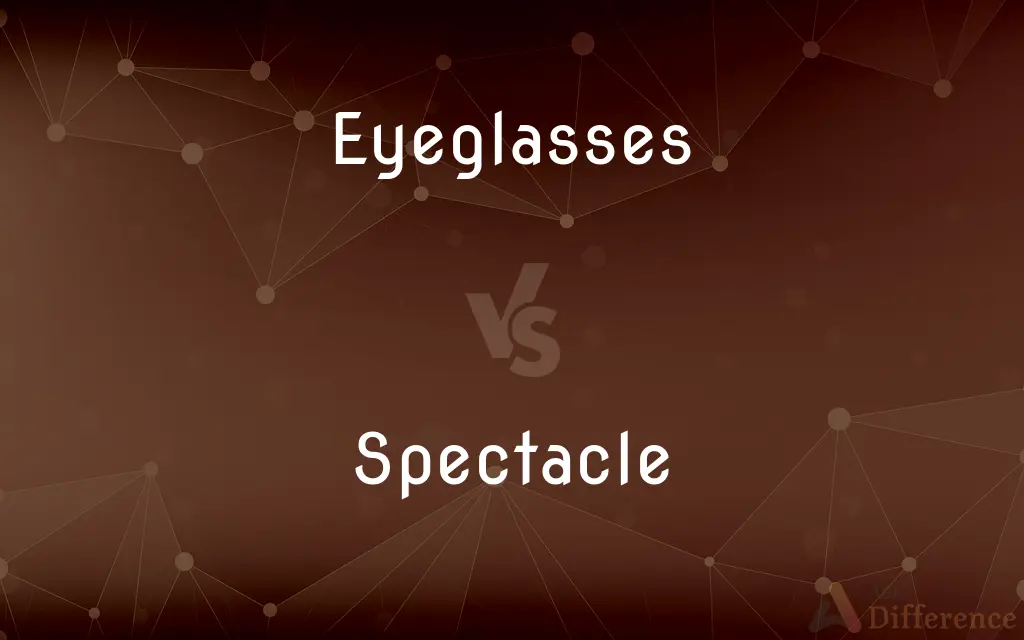Eyeglasses vs. Spectacle — What's the Difference?
By Fiza Rafique & Urooj Arif — Updated on April 8, 2024
Eyeglasses are corrective lenses mounted in frames, while spectacle often refers to eyeglasses but can also mean a visually striking display.

Difference Between Eyeglasses and Spectacle
Table of Contents
ADVERTISEMENT
Key Differences
Eyeglasses, also known as glasses, are devices consisting of glass or hard plastic lenses mounted in a frame that holds them in front of a person's eyes, typically using arms that rest over the ears. The primary purpose of eyeglasses is to correct or improve vision, whether for nearsightedness, farsightedness, astigmatism, or presbyopia. Spectacle, in one of its uses, refers to eyeglasses, emphasizing their role as visual aids. However, the term "spectacle" can also denote any remarkable, visually striking display or event that is meant to be observed and admired.
While eyeglasses are a functional item designed with a focus on utility and comfort, the use of "spectacle" in other contexts evokes the idea of grandeur, attention-grabbing appearances, or dramatic presentations. In the context of eyeglasses, the term may be used somewhat archaically or in literary contexts, hinting at the object's visibility and presence on the face. On the other hand, when speaking of a spectacle in the sense of an event or display, it conveys the sense of something extraordinary, memorable, or visually impressive.
The production and design of eyeglasses have evolved significantly, with a focus on materials, durability, and aesthetic appeal, reflecting technological advances and fashion trends. Meanwhile, the concept of a spectacle, in its broader sense, highlights human creativity, artistic expression, and the capacity to evoke wonder and amazement.
Eyeglasses serve a crucial role in health and daily functioning for many individuals, addressing specific visual impairments and enhancing quality of life. The spectacle, as an event or display, plays into human fascination with beauty, extravagance, and the extraordinary, often serving as a form of entertainment, celebration, or public statement.
Comparison Chart
Definition
Corrective lenses mounted in a frame
Eyeglasses or a visually striking display
ADVERTISEMENT
Primary Use
To correct or improve vision
To refer to eyeglasses or to impress and entertain
Context
Functional, health-related
Literary, entertainment, or dramatic contexts
Focus
Utility, comfort, vision correction
Visual impact, grandeur, memorability
Evolution
Advances in materials, design, and technology
Changes in cultural expressions of art and drama
Compare with Definitions
Eyeglasses
Functional design.
The eyeglasses combined functionality with a stylish design.
Spectacle
Literary or archaic use for eyeglasses.
She peered over her spectacles with a look of curiosity.
Eyeglasses
Mounted in a frame.
His new eyeglasses featured a lightweight titanium frame.
Spectacle
Entertainment and drama.
The theatrical performance was a spectacle of light and sound.
Eyeglasses
Technological and fashion trends.
The latest eyeglasses models showcase advanced materials and fashionable designs.
Spectacle
Visually striking display.
The fireworks show was a true spectacle, lighting up the night sky.
Eyeglasses
Health-related utility.
Wearing eyeglasses significantly improved his quality of life.
Spectacle
Focus on visual impact.
The parade was designed to be a spectacle, complete with elaborate floats.
Eyeglasses
Vision correction.
Eyeglasses were prescribed to correct her nearsightedness.
Spectacle
Reflects creativity and extravagance.
The art installation became a city-wide spectacle, drawing crowds from all over.
Eyeglasses
Eyeglasses Glasses for the eyes.
Spectacle
In general, spectacle refers to an event that is memorable for the appearance it creates. Derived in Middle English from c.
Eyeglasses
A single lens in a pair of glasses; a monocle.
Spectacle
Something that can be seen or viewed, especially something of a remarkable or impressive nature.
Eyeglasses
See eyepiece.
Spectacle
A public performance or display, especially one on a large or lavish scale.
Eyeglasses
See eyecup.
Spectacle
A regrettable public display, as of bad behavior
Drank too much and made a spectacle of himself.
Eyeglasses
(US) Spectacles, glasses.
Spectacle
A pair of eyeglasses.
Eyeglasses
A pair of lenses fixed together in a frame, used for correcting defective vision. Also called a pair of eyeglasses. See also eyeglass{1}.
Spectacle
Something resembling eyeglasses in shape or suggesting them in function.
Eyeglasses
Optical instrument consisting of a pair of lenses for correcting defective vision
Spectacle
An exciting or extraordinary scene, exhibition, performance etc.
The horse race was a thrilling spectacle.
Spectacle
An embarrassing or unedifying scene or situation.
He made a spectacle out of himself.
Spectacle
An optical instrument consisting of two lenses set in a light frame, worn to assist sight, or to protect the eyes from bright light.
Spectacle
(obsolete) A spyglass; a looking-glass.
Spectacle
The brille of a snake.
Spectacle
(rail transport) A frame with different coloured lenses on a semaphore signal through which light from a lamp shines at night, often a part of the signal arm.
Spectacle
Something exhibited to view; usually, something presented to view as extraordinary, or as unusual and worthy of special notice; a remarkable or noteworthy sight; a show; a pageant; a gazingstock.
O, piteous spectacle? O, bloody times!
Spectacle
A spy-glass; a looking-glass.
Poverty a spectacle is, as thinketh me,Through which he may his very friends see.
Spectacle
An optical instrument consisting of two lenses set in a light frame, and worn to assist sight, to obviate some defect in the organs of vision, or to shield the eyes from bright light.
Spectacle
Fig.: An aid to the intellectual sight.
Shakespeare . . . needed not the spectacles of books to read nature.
Spectacle
Something or someone seen (especially a notable or unusual sight);
The tragic spectacle of cripples trying to escape
Spectacle
An elaborate and remarkable display on a lavish scale
Spectacle
A blunder that makes you look ridiculous; used in the phrase `make a spectacle of' yourself
Common Curiosities
Are eyeglasses and spectacles the same thing?
Eyeglasses refer specifically to vision-correcting devices, while "spectacle" can mean eyeglasses or any remarkable visual display.
Can the term "spectacle" be used in a modern context to refer to eyeglasses?
While it's less common today, "spectacle" can still be used to refer to eyeglasses, particularly in literary or historical contexts.
How has the design of eyeglasses changed over time?
Eyeglasses have evolved with advances in materials and technology, leading to lighter, stronger, and more fashionable designs.
What makes something a "spectacle" in the context of an event?
An event is considered a spectacle if it is visually impressive, memorable, and designed to captivate and entertain observers.
Are there specific materials preferred in the making of modern eyeglasses?
Modern eyeglasses often use materials like polycarbonate, trivex, or high-index plastics for lenses, and metal or acetate for frames, prioritizing durability and comfort.
Can eyeglasses be both functional and fashionable?
Yes, contemporary eyeglasses are designed to serve vision correction needs while also following fashion trends, offering a range of styles and aesthetics.
What is the primary purpose of eyeglasses?
The primary purpose of eyeglasses is to correct or improve vision, aiding in daily tasks and enhancing life quality.
How do people typically react to witnessing a spectacle?
Spectacles are designed to evoke awe, wonder, or admiration, often leaving a lasting impression on those who witness them.
What role do spectacles play in culture and entertainment?
Spectacles, in the sense of grand displays, play a significant role in cultural expression, entertainment, and the arts, reflecting societal values and artistic creativity.
Is there a difference in the use of "spectacle" across cultures?
The concept of spectacle is universal in its appeal to visual grandeur, but specific expressions and forms can vary greatly across different cultures and historical periods.
Share Your Discovery

Previous Comparison
Creche vs. Kindergarten
Next Comparison
Swipper vs. SwapperAuthor Spotlight
Written by
Fiza RafiqueFiza Rafique is a skilled content writer at AskDifference.com, where she meticulously refines and enhances written pieces. Drawing from her vast editorial expertise, Fiza ensures clarity, accuracy, and precision in every article. Passionate about language, she continually seeks to elevate the quality of content for readers worldwide.
Co-written by
Urooj ArifUrooj is a skilled content writer at Ask Difference, known for her exceptional ability to simplify complex topics into engaging and informative content. With a passion for research and a flair for clear, concise writing, she consistently delivers articles that resonate with our diverse audience.














































